Specialty Café Culture in Guatemala
Special contribution by Jordan Buchanan.
SECOLAS is grateful to Jordan for his time and willingness to introduce Secolistas to this world of specialty café culture in Guatemala.
You might already have heard the term “specialty coffee,” but might not be familiar with the specifics of it. I will briefly explain specialty coffee before I share suggestions on the specialty market in Guatemala. The traditional way to define specialty coffee is outlined by the Specialty Coffee Association (SCA). They define specialty coffee as any coffee that scores more than 80 points at cupping. This score is part of a grading system for coffee quality based on distinct characteristics. Cupping is the term used for tasting coffee under specific protocols. You can learn more about this on their website here. In short, specialty coffee is coffee that achieves high quality status based on its unique characteristics. It tastes better. The industry prioritizes coffee quality as its main goal. This coffee exists in contrast to commercial coffee. Commercial coffee prioritizes the sale of coffee in order to make a profit; quality control exists, but it is less valuable. And to buy high quality coffee is more expensive, which cuts down on profit margins. Therefore, commercial coffee is exactly that; it exists for commercial purposes (i.e., profits).
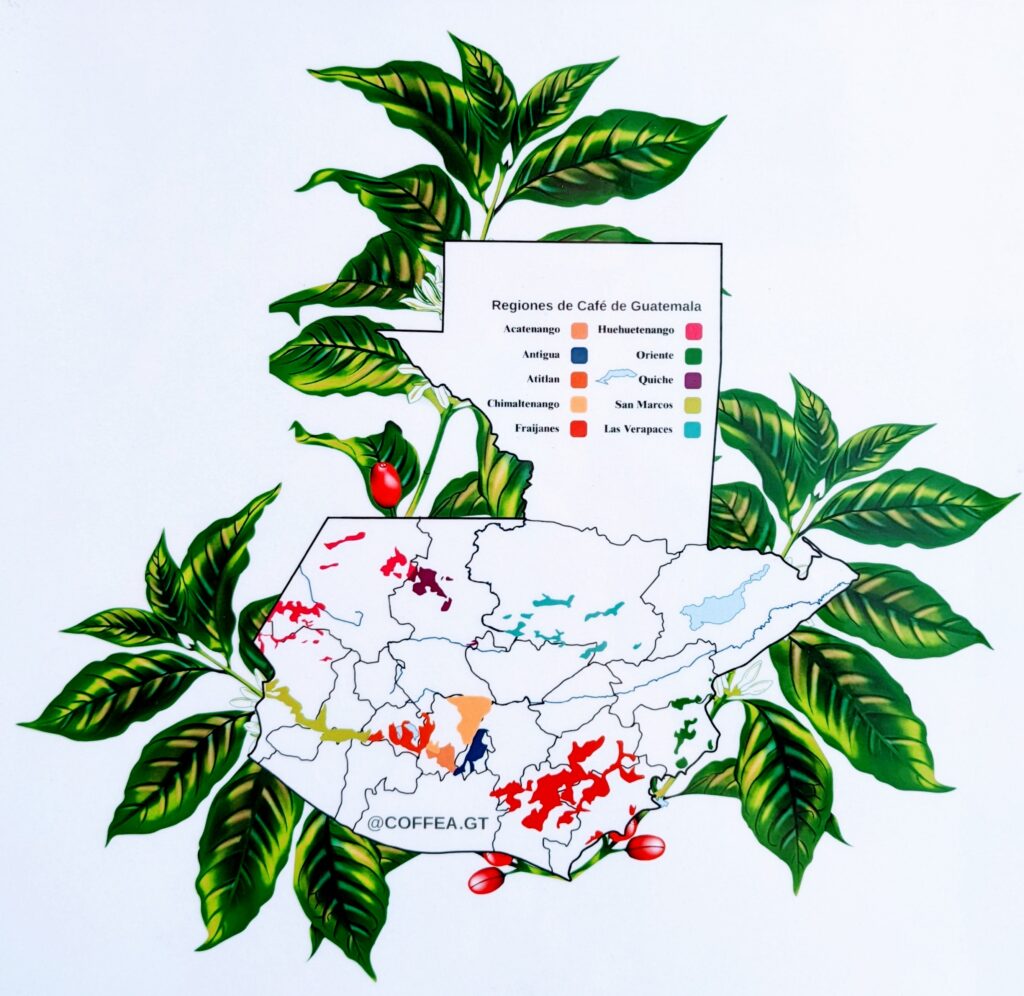
The working definition of specialty coffee is adapting to the realities of the trade. Another key concept of specialty coffee that goes beyond the SCA definition is that of “direct trade.” This type of trading is in part an adaptation to the ills of Fair Trade within the coffee world. Specialty coffeeshops work directly with farmers so that they can cooperate over their desired outcomes. The buyer seeks coffee of remarkable quality, and the producer seeks to be remunerated fairly for this work. You can often find coffee farmers sitting in the specialty cafes in Guatemala negotiating prices, discussing what processes the farmers are using and what both parties hope will be the outcomes of these processes. This practice allows for more consistency for coffee farmers as they are able to make agreements with coffeeshop owners. And the coffeeshop owners also benefit from this consistency because they can expect top quality coffee on repeat.
Furthermore, care for every member of the coffee chain is a crucial concept that specialty coffee protagonists talk about. From the finca to the front counter, specialty café actors are conscious of the work that goes into serving the perfect cup. There is a lot of collaboration at all stages of the coffee chain (farming, roasting, and preparation are 3 key stages). Actors involved want to build a fairer relationship within the coffee economy that rewards the laborious work of farmers. And the roasters and baristas take up the responsibility of ensuring that this valuable work of the farmers is cared for along the latter stages of production. This topic of why specialty coffee matters to the actors involved is layered in meaning. And I will leave it at this for now. Go into a specialty café, and ask the baristas why specialty coffee matters.
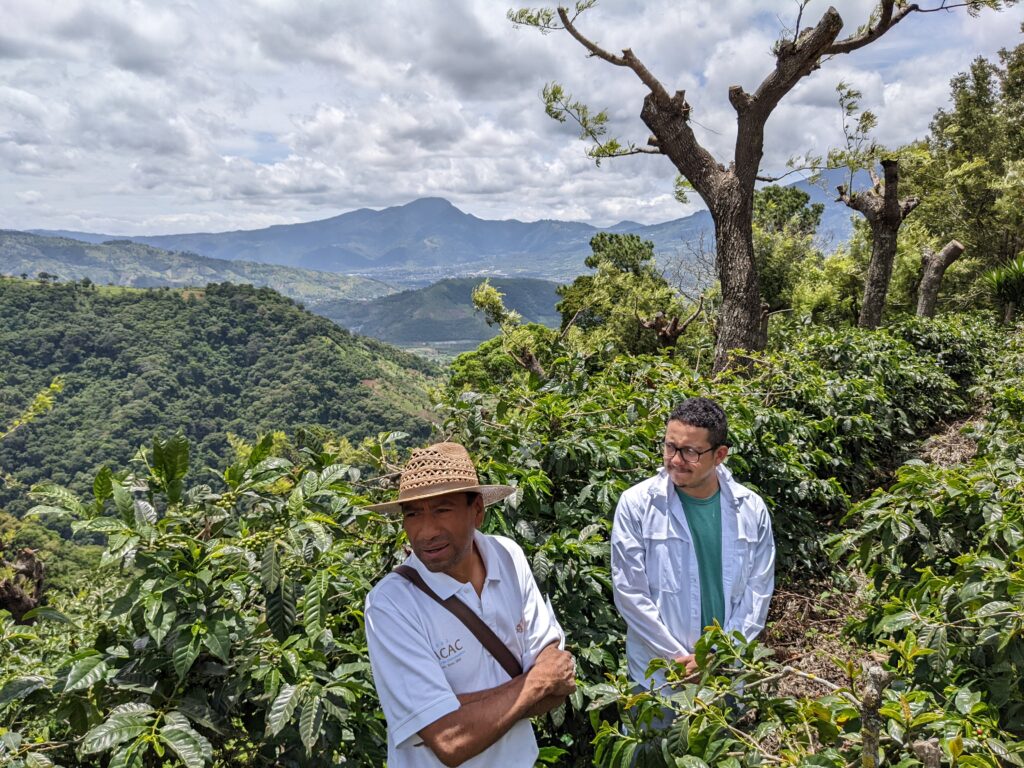
A good way to learn more about specialty coffee and its culture in Guatemala (also relevant to the rest of Latin America) is to interact with the actors in the industry. That starts by speaking with baristas about specialty coffee and their jobs as baristas (when they have some quiet time). They are usually very willing to talk about their life in specialty coffee. This interaction is emerging as a new principle that defines specialty coffee according to actors in Latin America.
What to Order?
Have you ever sat in a conference presentation and been disoriented by the jargon that flows from a speaker’s summary of research? Imagine having to take action in response to all this jargon that has likely left you wondering if you even like conferences anyway and maybe this will be your last. This experience can be similar to that of entering into a specialty café with all its esoteric terms, vibesy aesthetic and humans who seem to be much cooler than I ever could be. But beneath the surface, we usually find a very welcoming and caring individual who would love to interact with you over your life’s passion as they share theirs with you. A few key words are all it takes to open up a world of interest, like “historiography,” “interventions,” “contributions” and “theoretical framework.” Here are a few key terms that will help you make your specialty coffee order and understand what you are asking for when you enter the jazzy ambience of the specialty café:
- V60 – a V60 is a pour over filtered coffee. It is a method that extracts a delicate tasting coffee and exposes the complex taste notes of the specific bean. This method is the most ordered filter coffee because of its clean taste and quality of extraction.
- Flat white – this is the classic specialty coffee drink made with milk and espresso. There is no S/M/L variation of this drink because it is a specified quantity of milk and espresso. The benefit of this drink is that it expresses a complex flavor as the ratio of milk to coffee allows for the two to interact and expose a unique taste. Counter this with a latte. A latte is a high quantity of milk which covers over the unique taste of the coffee. The latter is a great commercial coffee drink because you want the milk to cover over the harsh and bitter tastes of low-quality coffee. The flat white does the opposite.
- AeroPress – this is another filter coffee method. It has a denser, more intense, more full-bodied taste than a V60 and is the entry point for many people into the specialty coffee world. I bought an AeroPress in 2020 for 30 USD; it changed my world.
- Espresso – this drink is the same as what you likely already know. But a key distinction for the taste of specialty coffee espressos is that they will taste more acidic compared to commercial coffee. The espresso is a much more intense taste. It is a drink for specialists usually. It is not something that most specialty enthusiasts will talk about or drink. Here is an article that discusses its masculinity – a trait that is generally decentered in specialty coffee.
- Coffee processing – Coffee processing is what actors at the farms do after harvesting the coffee bean from the plant. It is the process of turning the coffee fruit into a coffee bean ready to be roasted at the next stage of the coffee chain. The most common processes are “washed” and “natural.” You will find information on these processes at Perfect Daily Grind (a reputable specialty coffee media source) here. For a simple understanding based on taste, washed coffees are clean, delicate, fine tastes. A natural coffee is more expressive, potent and funky as a taste profile. Of course, all coffees are unique and complex. They vary. But this description is a general intro to help distinguish.
- Varietals – there are a lot of varietals. In specialty coffee at the moment, all varietals that you will find are from the Arabica family. Robusta is a different family that has its own story and you won’t find in specialty cafes in Guatemala. So, I will save the distinction here. There are so many varietals in specialty coffee that I won’t go into them for space and to avoid too much complexity. But I will add that the Geisha/Gesha varietal is the most highly valued/priced coffee. There is a lot of hype about it. I will leave it up to you if you want to follow the hype.
- Region – the different regions of Guatemala will be displayed on the coffee bags. This is a talking point for most coffee enthusiasts as they tried to categorize knowledge of coffee based on geography and try to understand the different characteristics of the unique physical terrain that influences the taste of each coffee grain.
- Sugar? We are all creatures of habit, and putting sugar into your coffee might be one of yours. That is fine. But in specialty coffee, the guiding idea is that the coffee beans have been grown, roasted and served all for the purpose of exposing the organic flavors of that specific coffee and the natural sugars in the bean should make the cup already have a balanced sweetness. Adding sugar interferes with tasting profile that the actors in the coffee chain have tried to create through their methods to create unique flavors. Sugar will cover over that flavor, and you will have a generic taste. Still a good taste, but it will lack uniqueness and complexity. However, put some sugar in there after you have a sip without sugar if your palate has not yet accustomed to the natural sugars.
- Milk? Similar to sugar, milk interferes with the natural flavor of the coffee. But in this case, that is encouraged to create new tastes in espresso-based drinks. In filtered coffees, it is recommended to not use milk because the flavor is so delicate that the milk will cover over the complex profile of the coffee. But remember, the best cup of coffee is unique to each person. Put milk in it if you want. Nobody is judging, except the coffee judges…
Farms Near Antigua, Guatemala
Beyond the coffee bar, I recommend you visit a coffee farm to hear from the actors who collaborate with the environment to create the tastes of specialty coffee.
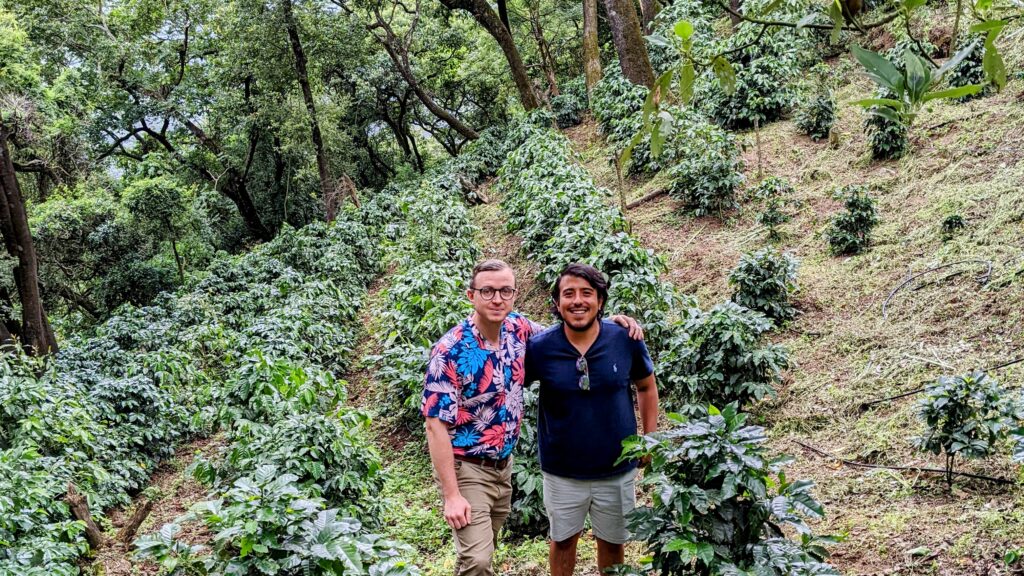
Below is the information for two specialty coffee farmers that run farm visits and are two strong representations of Guatemala’s growing specialty coffee culture from the agricultural perspective. Both offer different views of the coffee farming life:
- Felipe Contreras – Felipe is young and ambitious. His coffee can be found around the world and his coffee’s reputation is up there with some of the best in Guatemala, after only a few years in the industry. Felipe’s farming techniques are inspiring change in Guatemala, and it is receiving its deserved international recognition. I visited Felipe in summer 2022, and in December 2022 I was drinking his coffee roasted by Manhattan Roasters from Rotterdam while I was in cafes in Vienna and Budapest. Felipe will talk you through the different ways to process coffee and will also be able to show off the many coffee varietals he grows. His farm is located close by Antigua, and you would get a chance to experience the tropical agriculture in a rainforest setting. Felipe can also do tours in English, and a tour would require 2-3 hours.
- Félix – Félix has been working in agriculture his whole life and has worked closely with social projects within his rural community. He moved into specialty coffee in the last few years and has had great success at producing some indelible coffees. His farm is located on a picturesque mountain overlooking Antigua region with a view that stretches beyond the volcanoes and into the ocean (on a clear day). This farm visit is a wonderful opportunity to get out of the city and into the verdant sky while learning more about the coffee trade. I received a bag of his coffee from Coffea after visiting Felix’s farm in summer 2022. I had great pleasure sharing this bag with other specialty coffee protagonists in Princeton, New York, Mexico City and Puebla; I doubt they will be forgetting it any time soon either. A tour of Félix’s farm requires around 4 hours all in (45 minute drive to the farm).
(Note: these visits do not require physical fitness, but do require a small amount of walking in farmlands).
Sensorial Course
Honey, Jasmine, Peach and Apricot; these are just some of the tasting notes that coffee companies lie to you about in order to sell you a bag of coffee. Well, that is exactly what I thought until I entered into the world of specialty coffee a few years ago. With the specialist brewing techniques, intelligent roast profiles and well-cared for coffee plants, specialty coffee delivers on these appealing taste notes that you see on the bag. However, on first try, you will unlikely recognize the specific taste notes that coffee specialists have assessed. You will notice that the coffee is distinct from the commercial coffee to which you are likely accustomed. Building a palate to taste the flavor profile of coffee takes time – much like whisky and wine, but without the hangover.
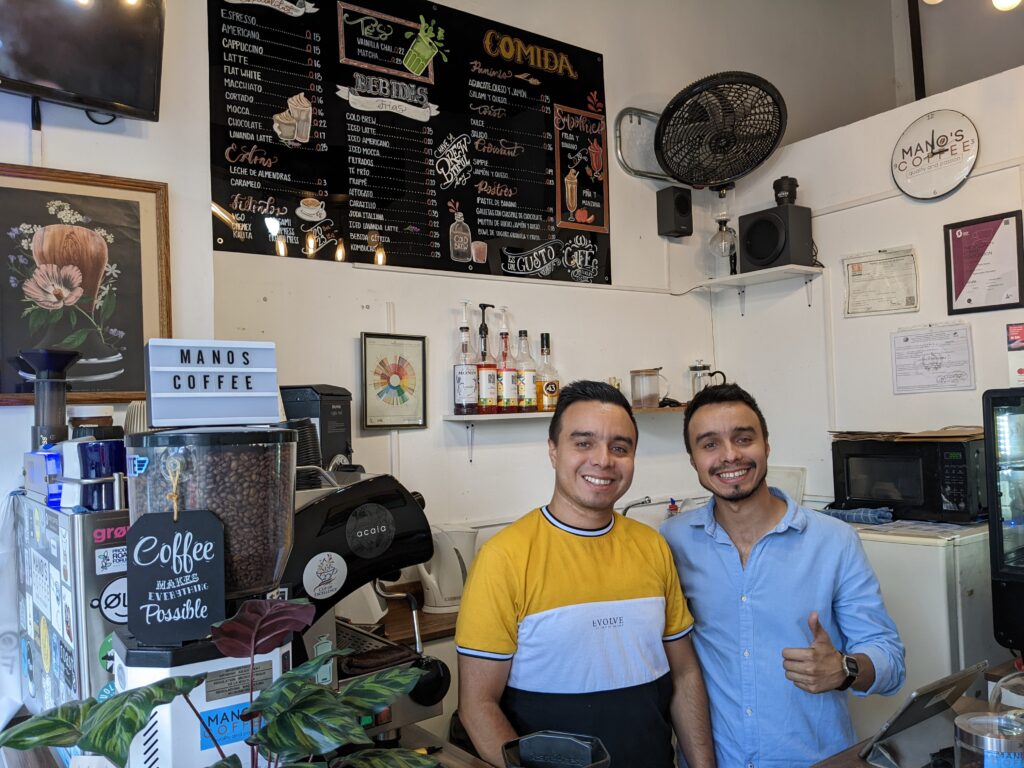
A great way to work on your tasting senses is to visit María Andrée at Artista de Café while in Antigua. She has designed a course that helps you focus on improving your olfactory system to be able to appreciate the flavors of coffee. This course will help unveil those tasting notes that you have likely doubted before, or will strengthen your already skilled palate. And time with María Andrée to allow her to sooth you into a meditation-like experience while your neural system builds new tasting networks is worth the occassion alone. She is also a wealth of knowledge on specialty café culture in the country. A special point of note, Will Smith deliberately visited her café when he was filming in Guatemala in 2022. María Andrée nervously served him a double-shot Americano.
For more on this sensorial course, see this article that I wrote about it for Barista Magazine: María Andrée Is Honing Olfactory Skills in Antigua (baristamagazine.com)
Specialty Coffeeshops
Here is a list of specialty cafés in Antigua with a description of some of their unique features. Every one of these cafés will serve you the best quality coffee that is currently circulating in the Guatemalan specialty coffee scene. The different cafes work with different farmers that have different coffee producing methods, but all are specialty coffee and all have the same goal of serving the optimal cup. You will hear more about the stories of these cafés in my conference presentation. I have shared a little bit of background information on some of them here.
Artista de Café
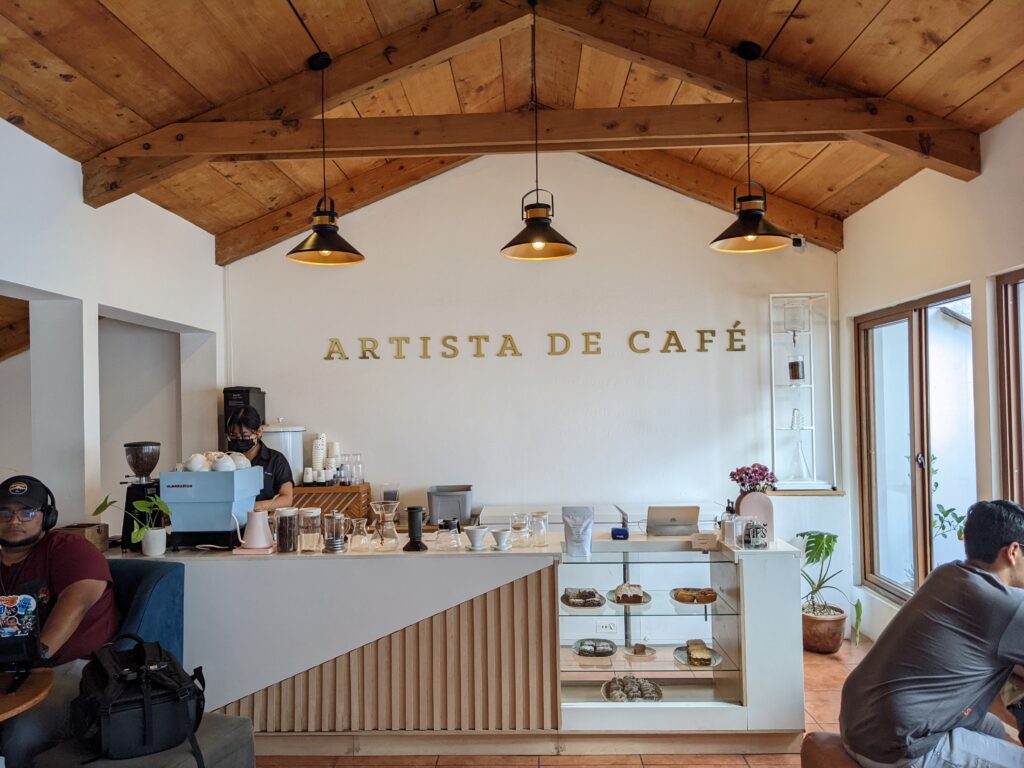
María Andrée (the owner) wanted this café to be a feminine space. She wanted it to be a comfortable and safe environment for people to come and enjoy the delights of specialty coffee. She has succeeded. This café is known by almost anyone who passes through Antigua on the backpacker/digital nomad trail. It might just seem like any other vibesy café that you find in gentrified spaces. However, it is a serious and professional specialty coffee outfit.
A major selling point for this place is that it is located next to the conference venue. If you want to avoid the intestine-staining, harsh and bitter tastes of commercial coffee, then pop round here to get a takeaway specialty coffee to not only keep you going during the conference, but also to enliven your senses as you experience Guatemala’s specialty grounds.
Coffea
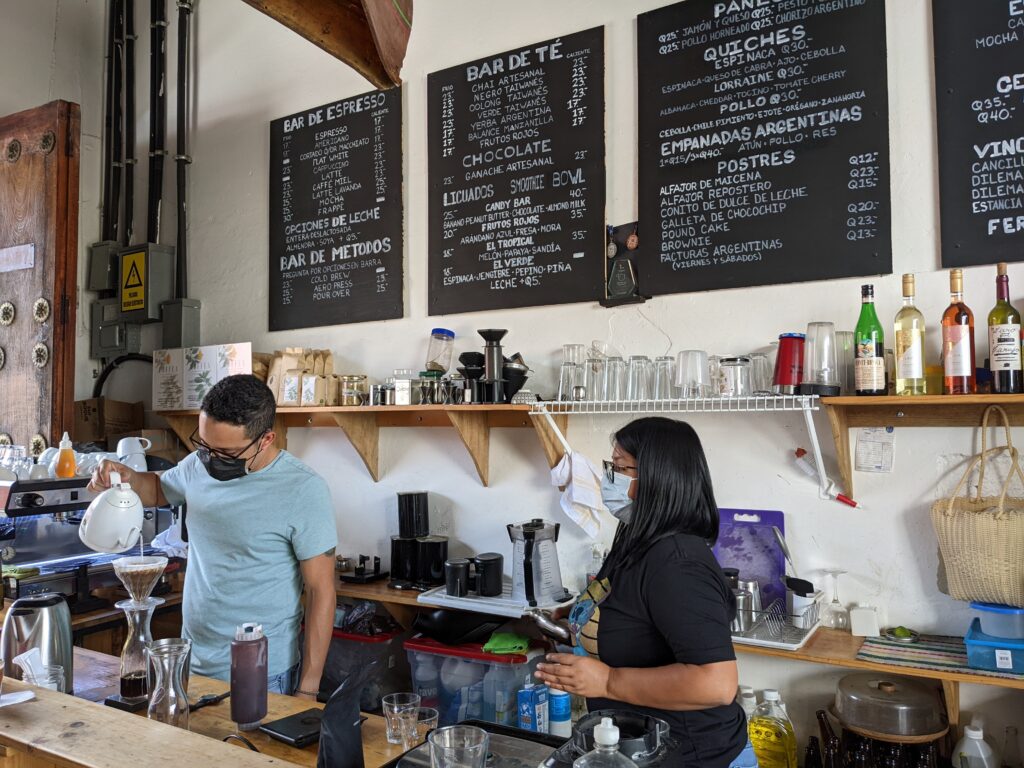
The owner of this café, “Frosty”, is one of the most well-connected and deeply informed actors within the Guatemalan specialty coffee trade. And his care for coffee reflects in his care for his café staff. Set up as a small bar within a wider commercial space, this café has a low-key feel. But do not be misled by this humility; here you will find spectacular coffee and insightful baristas.
Alegria Café
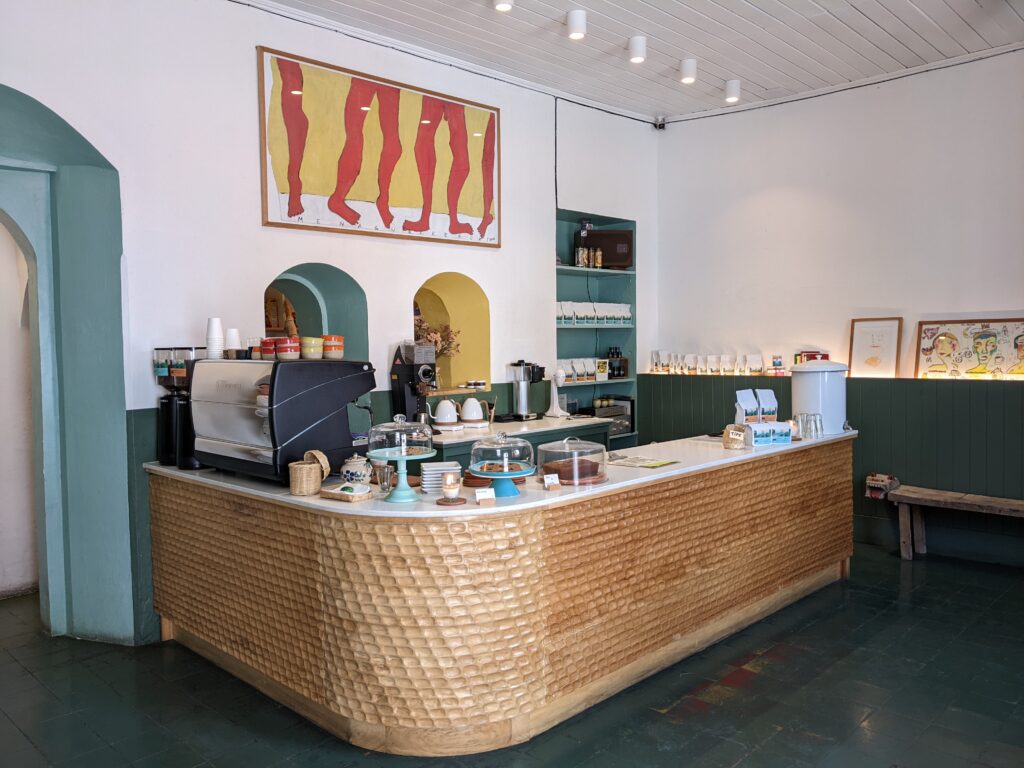
Markos wanted this café to be a place where people come together to enjoy specialty coffee and converse. He specifically did not want to encourage digital nomad culture within his café to allow for an ambience of presentness. Therefore, there is no Wi-Fi in this café, but there is plenty of bandwidth to start a conversation with other travellers and the baristas. Maybe also a good spot to read where you wont be distracted by the internet.
I will likely be hosting a free coffee tasting event here for a public audience (in Spanish). I will share some of my work on Mexico and we will taste Mexican specialty coffee from specialty cafés in Puebla, Tijuana and Mexico City.
12Onzas
This café sells only coffee from its own farm in Huehuetenango. It is award-winning coffee. But the aesthetic of this shop is its primary marketing point for general customers. Guatemalan owners described it to me as a “Instragameable”. Atenea (the owner) has designed this store to be visually pleasing to accompany the palate pleasing experience of specialty coffee. Also, the co-owner of this outlet (David) is three times national champion barista in Guatemala. He trains all the baristas who work for 12Onzas, so you can always expect a perfectly prepared cup. Adding to this, Atenea has a high value of her staff. Her care for her employees is demonstrated by their willingness to stay. Many 120nzas’ baristas have been pulling espressos for the company for many years due to their sense of belonging and importance in the coffeeshop.
Fat Cat
This café was the first specialty shop in Antigua. The owner’s mother was a coffee picker in the farms surrounding Atitlán while she raised her son Gerson. His story of becoming a pioneer of the specialty café culture is a fascinating one, which you will hear more about in my conference presentation.
It has two locations: the original café and the new coworking space café. The design of the original café is more rugged and inspired by Gerson’s experience as a car mechanic and as a lover of automobiles. The coworking space is a more contemporary design focused on creating a comfortable working space for the many digital nomads that have set up in Antigua after the start of the COVID-19 pandemic.
Café Sol
This café is a relaxed space. It is located away from the busiest streets of the city. The café may seem like a soft setting for ordinary coffee. But the owner, Pedro, acquires only the best coffees in Guatemala. He is well connected in the coffee world, which supports the training of his staff and his procurement of coffee. If you want to get away from busy streets and coffeeshops, then this is an ideal break.